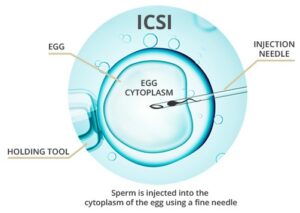Intracytoplasmic sperm injection (ICSI) is an assisted reproductive technology (ART) used to treat sperm-related infertility problems. ICSI is used to enhance the fertilization phase of in vitro fertilization (IVF) by injecting a single sperm into a mature egg. The fertilized egg is then placed in a woman’s uterus or fallopian tube.

How does ICSI work?
There are two ways that an egg may be fertilized by IVF: traditional and ICSI. In traditional IVF, 50,000 or more swimming sperm are placed next to the egg in a laboratory dish. Fertilization occurs when one of the sperm enters into the cytoplasm of the egg. In the ICSI process, a tiny needle, called a micropipette, is used to inject a single sperm into the center of the egg. With either traditional IVF or ICSI, once fertilization occurs, the fertilized egg (now called an embryo) grows in a laboratory for 1 to 5 days before it is transferred to the woman’s uterus (womb).
Why would I need ICSI?
ICSI helps to overcome fertility problems, such as:
- The male partner produces too few sperm to do artificial insemination (intrauterine insemination [IUI]) or IVF.
- The sperm may not move in a normal fashion.
- The sperm may have trouble attaching to the egg.
- A blockage in the male reproductive tract may keep sperm from getting out.
- Eggs have not fertilized by traditional IVF, regardless of the condition of the sperm.
- In vitro matured eggs are being used.
- Previously frozen eggs are being used.
